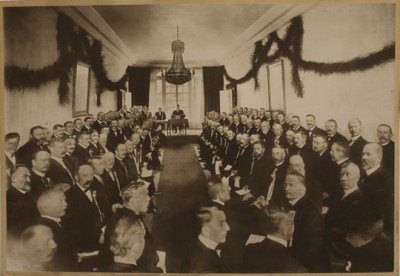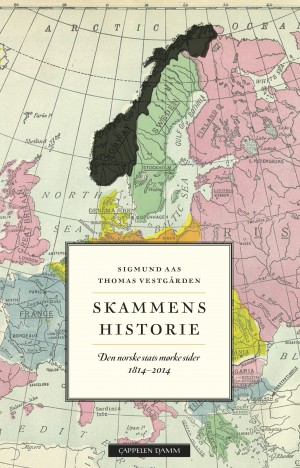As Norway launches a year of festivities to mark the bicentennial of its constitution, two authors are reminding Norwegians that their constitutional history has many dark chapters as well. In a new book charting “shameful” issues and events since the constitution was approved in 1814, they maintain that Norwegians are “still sinning,” while others are questioning what they feel are some glaring omissions in the bicentennial’s program.

Some of the questions started being raised last year, not least regarding the Norwegian constitution’s original and highly controversial “Paragraph 2,” which banned monks, Jesuits and Jews from the country. The monks and Jesuits were viewed as missionaries for a different faith than the Lutheran religion that was laid down in the laws of the time, noted newspaper Aftenposten after drafts of the bicentennial program that failed to highlight the paragraph began circulating. The Jews, wrote Aftenposten, were apparently barred simply because they were Jewish.
Normally referred to as jødeparagrafen (the Jewish Paragraph), it was approved by the constitution’s founding fathers in 1814 but revised in 1851 after a long campaign by poet and early human rights activist Henrik Wergeland. The ban on Catholic monks, however, remained part of Norway’s Constitution (Grunnloven) until 1897 and it wasn’t until 1957 that its ban on Jesuits was removed, noted Aftenposten.
Jewish and July 22 omissions
“It’s not easy to find much (in the official bicentennial program) about the problems of Paragraph 2,” Ervin Kohn, long active in Norway’s Jewish community and now a deputy leader of the Center Against Racism in Oslo, told Aftenposten. “We know that the Jews were banned, but we don’t know why.” Kohn was reluctant to criticize those who’ve put the festive bicentennial program together, or suggest that they have glossed over a particularly troublesome portion of Norway’s much-exalted constitution. He simply thinks the 200-year jubilee in 2014 could have been better used as an opportunity to study what went into the paragraph, and learn more from it.
Tor Bomann-Larsen, a Norwegian historian and author of a series of books on the rise of Norway’s constitutional monarchy, has no reservations about criticizing the bicentennial organizers on another matter. He feels the 2014 celebrations overlook the effects of the July 22 terrorist attacks in Oslo, which he believes posed the biggest single attack on Norway’s democracy since World War II.
Bomann-Larsen noted that July 22 itself is missing from the bicentennial program of events throughout the year, relegated merely to a “cryptic” mention that the jubilee “should contribute towards insight into Norwegian democracy when confronted with the occupation in the war years 1940-45 and other serious threats such as the terrorist attacks on July 22, 2011.” But no specific events are scheduled in connection with the day itself, Bomann-Larsen wrote in a commentary in Aftenposten last month, to his disappointment.

Tackling shame
Debut authors Sigmund Aas and Thomas Vestgården, both of them active and educated in human rights issues, are tackling other thorny issues of Norway’s history since the constitution was approved in 1814 head on. In their new book, provocatively titled Skammens historie (The history of shame), they say they’re trying to present a “history of the Norwegian mentality” in their book that highlights many events and issues since 2014 that the country would probably rather forget. They include such dark chapters as the torture, isolation and executions that were carried out against convicted prisoners, persecution of not only Jews but also tater and other migrant folk groups, forced lobotomies and commitments to psychiatric institutions for “deviant” persons, and even the discovery of a mass grave of unidentified persons outside Ris Church, which lies in the otherwise fashionable area near Norway’s main psychiatric hospital at Gaustad.
Aas and Vestgården write that at least 50 unidentified men and women of Romani background lie in the grave, most of whom were committed to Gaustad and apparently died there. The persecution of Romani and other migrant folk is a recurring theme in their book, also the forced sterilizations of more than 230 women whose children were also taken away from them. “That would be categorized as genocide today,” Vestgården told Aftenposten.
‘Difficult to be different’
In a lengthy column in newspaper Dagsavisen on Monday, the authors conclude that it’s always been difficult to be different in Norway. Aas thinks it has to do with strong desires in 1814 and thereafter for a nationalism that would gather Norwegians as a united people with one religion and language. “That can be positive, but it’s difficult for those who fall outside the definition,” said Aas, who has a master’s degree in human rights and has led the board of Amnesty International’s judicial student network.
“Groups of people who are unpopular have always been more subject to human rights violations and attack, and we’re still sinning,” Aas told Dagsavisen. After World War II, it was the nordlendinger (people from Northern Norway) who were targeted, he said, then the Pakistanis who started arriving in Norway. “Before that it was the Catholics and the Jews, today it’s the Roma folk,” he said. “They’re chased around town. Groups change, but the rhetoric against them is the same.”
Jan Egeland, a veteran Norwegian diplomat who now leads the Norwegian Refugee Council, agrees that “we have little reason to be proud of how we treat foreign cultures and minorities.” Egeland thinks Norwegians are more open-minded and concerned about human rights now, even though it can still be hard to be “different” in Norway.
Freedom under fire
Aas and Vestergården also note in their new book how Norwegians as well have faced persecution for “thinking differently,” and expressing unpopular opinions. Even though the constitution of 1814 guaranteed freedom of expression in Norway, editors and journalists were routinely jailed during the 1800s after criticizing the authorities. Punishment for alleged blasphemy also has a long history in Norway, they point out, with author Agnar Mykle and publishing firm Gyldendal censored and sued for allegedly pornographic content in Mykle’s book Sangen om den Røde Rubin.
“We are two debut authors taking a new and critical look at Norway’s history,” they wrote in Dagsavisen on Monday. “Amidst all the jubilation around the 17th of May and the celebration of the constitution, we invite some reflection … We seek a critical and systematic searchlight on the motivations behind the Norwegian state’s darker chapters. As we celebrate ourselves, it’s important not to forget those who have been excluded from society.”
No offense intended
King Harald touched on the same theme during his address at Sunday night’s launch of the bicentennial festivities, which were aired live nationwide on Norwegian Broadcasting (NRK), saying that he hoped they would celebrate “our freedom and wisdom, let us live under the Constitution with wisdom and compassion, let us stand up for what really means something to us.” Sunday night’s program included a wide range of ethnic groups and immigrants whom King Harald’s father, the late King Olav, dubbed “our new countrymen.”
There were critics on Monday, though, not least over what was meant as a humourous sketch over why Catholics and Jews were excluded in 1814. The deputy leader of the Christian Democrats party told state broadcaster NRK that she didn’t think that was something to joke about. Others felt there was too much emphasis on minorities in Norway in the opening program.
Organizers of the bicentennial program over the year say they never meant to offend anyone or exclude issues, like “Paragraph 2” or the effects of the terrorist attacks of July 22. Rather, they contend, they are providing a broad framework and leaving specific issues up to organizers of affected groups, who have or can receive support for their own events. The Holocaust Center n Oslo, for example, has recently received funding for a major study of the Roma folks’ history in Norway, while both the Holocaust Center and the Jewish Museum in Oslo have arranged their own exhibits or recognition of the effects of Paragraph 2. The bicentennial program, leader Dag Nordbotten Kristoffersen told Aftenposten, allows room for “many local arrangements and initiatives from organizations and groups.”
newsinenglish.no/Nina Berglund

